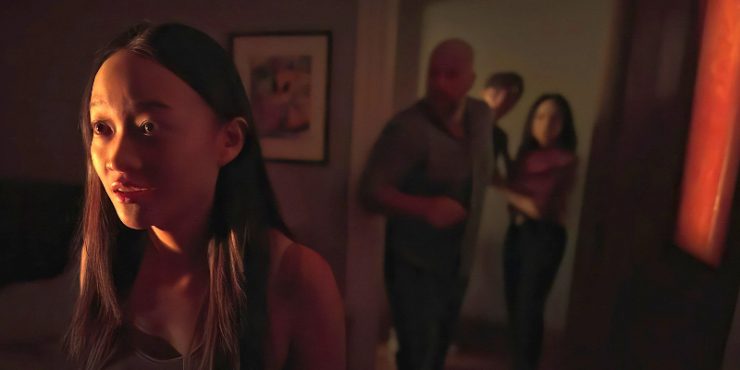Steven Soderbergh’s defiance of his own stature is a tension that makes all his films fascinating. His elder statesman status within the 90’s Video Generation means that he had the jump on the likes of Paul Thomas Anderson, Richard Linklater, and even Quentin Tarantino. In many ways, he has more interesting ambitions as a visual storyteller than any of those other directors, but he’s more compelled by innovation than by legacy. The scripts for his most recent films seem more like vessels through which he can experiment with whatever camera technique has caught his interest at the moment. The latest script, for Presence, is written by David Koepp, a masterful structuralist who wrote the scripts for Jurassic Park, Mission: Impossible, and the 2002 Spider-Man, among many others.
Koepp’s scripts are masterful works of broad appeal, which is why it’s funny to see him collaborate with Soderbergh, who seems completely uninterested in commercial prospects these days. Koepp also wrote the script for Soderbergh’s 2022 film Kimi, a drum-tight story that leaned into Soderbergh’s stripped-down, digital-forward directorial style. The clash between Koepp’s mainstream sensibility and Soderbergh’s indie kid aesthetic is one of the more fascinating parts of Presence, a new take on a ghost story, which succeeds in clever narrative devices but stumbles in making its characters much more than pawns to move its plot forward. While Koepp’s story whirs with reversals and complications, Soderbergh’s attention is on the shooting style which is from the perspective of the ghost itself.
It’s unfortunate timing for Presence. Soderbergh actually pulls off some genuinely interesting stuff in his first-person perspective, and when the film premiered at Sundance close to a year ago, it was championed for its original approach to its shot composition. But by releasing the film in January 2025, just a little over a month after Nickel Boys revolutionized what was possible with the first-person POV, Presence feels a little bit lacking, more like the gimmick it was trying to overcome. Like many films that choose to frame shots this way, the movie stretches the perspective to fit necessary story information. But to Soderbergh’s credit, his choices elevate the emotional impact of a script that lacks any real character development. The style somewhat conceals the story’s contrivances, but there’s only so much that Soderbergh can do.
The movie is about a family of four who moves into an old but charming Northeastern home. Rebecca (Lucy Liu) is a business woman who may end up in legal trouble very soon, and her husband, Chris (Chris Sullivan), is her hangdog husband debating whether he wants to stay aboard the sinking ship. Their son, Tyler (Eddy Maday), is a star swimmer and the apple of Rebecca’s eye, but their daughter, Chloe (Callina Liang), is a troubled drug user whose best friend just died from taking synthetic fentanyl. The new house has the humility of an aged home, but the expanse of something more elegant. It seems perfect. What they don’t realize is that it houses a poltergeist, who watches their every move, never leaving the home. We vicariously witness the families plurality of dramas: Rebecca’s oncoming comeuppance, Chris’s existential crisis, Chloe’s grief. The camera has a sense of attachment to these people, but what that attachment is only reveals itself over time.
Whose perspective are we viewing? That is (somewhat) the central question of Presence. The movie takes some clever turns, even if it feels a bit too beholden to the beats of a screenwriting text book. Koepp sometimes presses his thumb on the scale to get the desired effect from characters he’s mostly underwritten. The movie is mostly saved by a finale that not only brings closure to the central mystery, but also gives Liu a scene which she absolutely kills. Liu is a brilliant actress who has never been given proper opportunity. You may sometimes feel like she’s being wasted even within the eighty-five minutes of this movie. One gets the sense that Soderbergh was so interested in his shooting style that he didn’t take the time to really curate the performances, which are good but somewhat wayward within the aggressive visual conceit. But when he calls upon Liu to crack open in the film’s most important scene, she absolutely delivers and rescues Presence from mediocrity.
Directed by Steven Soderbergh










